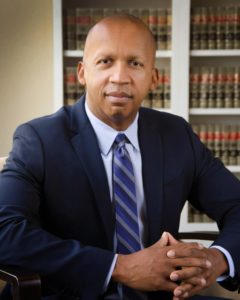
Bryan Stevenson
Sometimes you see someone so special that it literally takes your breath away.
Someone so brilliant and emotionally intelligent that their words stop you in their tracks and you are left changed by the experience.
That’s how I felt when I heard Bryan Stevenson speak recently at the annual meeting of Leadership Florida in Orlando.
Stevenson is the founder of the Equal Justice Initiative which is the subject of a new HBO documentary.
His work focuses on race and criminal justice reform and how we can inch our way toward a more perfect union.
We live in a society in which 1 in 3 African American males and 1 in 6 Latino men will end up incarcerated; a disturbing statistic that we somehow seem to accept. As if those lives are disposable. As if our nation can afford to throw these people away.
Stevenson wants us to chafe at these statistics.
It’s not that he wants us to feel bad or guilty.
In fact, he wants us to heal and feels that the only path to healing is facing what ails us as Americans.
Stevenson is a founder of the only museum dedicated to the history of lynching in America. It’s located in Montgomery, Alabama.
In fact, he was in Orlando to dedicate a marker at the site of a lynching in that city right here in our state.
By putting the issues front and center, Stevenson is hoping to spark a dialogue and a process that will ultimately lead to the airing of truths and a national reconciliation.
He fears what will happen to us if we don’t discuss these painful issues—slavery, bigotry, racism, violence. He believes it is keeping us apart.
Regardless of how you feel, it’s hard to deny that we have a racial divide in this country and in our own community.
Delray has a fraught relationship with race—Swinton has been a dividing line, we wrestle with issues of equity, trust, inequality and how to communicate.
I see it every day in Delray.
I feel it too.
I know I am not alone.
But I also know that many people don’t feel the tension or have no interest in engaging.
But those who care about making a lasting difference should care. Because the divide holds us back and we are forever at risk of volatility if we ignore or pretend that these issues aren’t real or don’t exist. We will never reach our potential until we face up to what separates us.
So what we can do?
Stevenson suggests that we put ourselves where we typically refuse to venture.
The best part of Stevenson’s powerful message was his plea for people, especially those who seek to lead to get “proximate” to the issues in their communities.
Stevenson urges all of us to get close to the issues and get to know the most troubled parts of our community.
Proximity enables us to understand, empathize and eventually help.
Distance keeps us apart and does not allow for solutions to take root. It may even be wasteful since often we will prescribe the wrong solutions to community problems because we haven’t taken the time to get close to the suffering.
It may seem easier to turn away, but it’s not says Stevenson. The price we pay is too high—estrangement, anger, violence, division and a host of other ills.
As I watched Stevenson mesmerize a large crowd of experienced leaders, I couldn’t help but think that this is the kind of leadership we are missing in our cities and inour country.
We need leaders who share, empathize and truly care to get close enough to understand, grow and evolve.
It takes an investment of time and heart. It takes a willingness to set aside preconceptions and open ourselves to possibilities and healing.
This not us versus them politics designed to keep us angry and apart. This is true inclusiveness, idealistic and human. It summons our better angels.
We can choose to remain angry, divided and sure of our positions from the safety of our couches and echo chambers or we can be “proximate” and learn to love thy neighbor.
It’s a simple choice. And an obvious one.